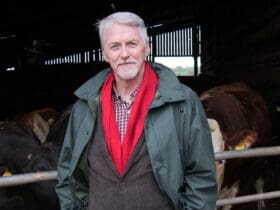The Farmers’ Union of Wales (FUW) has responded to the Welsh Government’s consultation on post-Brexit rural support by proposing a framework and dynamic farm support system that takes full account of all Welsh Wellbeing Goals, National Wellbeing Indicators and other Welsh objectives.
The Welsh Government had proposed in its Sustainable Farming and our Land consultation – the deadline for which was 30 October – that future farm and rural support should be focussed on the United Nations’ definition of ‘Sustainable Land Management’, and that this should be the objective of a future policy.
“While the UN’s Sustainable Land Management definition is certainly valid, Wales’ Wellbeing of Future Generations Act 2015 encompasses a far broader set of principles which are defined by seven Wellbeing Goals and forty-six National Wellbeing Indicators,” said FUW Head of Policy Dr Nicholas Fenwick.
“These principles relate to language, prosperity, equality, employment and renewable energy production to name but a few. We believe not only that a future policy framework should encompass these and other Welsh objectives, but that the law requires this to be the case.”
Given that the UN’s Sustainable Land Management definition was drawn up with no knowledge or consideration of Welsh objectives, it can only form part of a holistic framework setting out Welsh priorities and objectives, added Dr Fenwick.
The FUW also says that focussing support “…principally [on] environmental outcomes…”, as proposed by the Welsh Government, would mean any benefits to jobs, prosperity, language or other Welsh priorities would be inadvertent or coincidental, and that such an approach would more likely lead to serious damage to Wales’ family farms and the role they play in Wales’ economy, society, culture and landscape.
“The proposal to base farm payments solely on the provision of Public Goods and environmental outcomes represents an overly narrow approach to the formulation of a future Welsh policy, given that the concept precedes the Welsh Wellbeing Act by decades and that Brexit provides the opportunity to design a genuinely new scheme that takes full account of all Welsh goals and objectives.
“Instead, we propose the delivery of a Sustainable Farming Scheme which is consistent not only with the Sustainable Land Management principles, but also the full range of Wellbeing Goals, National Wellbeing Indicators and other Welsh objectives,” said Dr Fenwick.
“This should be based on the broad framework described in the FUW-NFU Cymru Welsh Way Forward document published in October 2018, with key principles being ensuring stability, protecting family farms, supporting rural communities and Welsh Jobs, ensuring agriculture is sustainable and rewarding environmental outcomes.”
The union proposes such a scheme be created by developing current policies and the current RPW Online delivery system to create a system which properly rewards farmers for the annual provision of data and compliance with universal scheme obligations, through a baseline payment, while also using such data to dynamically drive improvements both nationally and at farm level by identifying actions which deliver against a range of objectives – including those relating to environmental outcomes.
“Under such a system, the current Welsh payment cap would be lowered and active farmer rules strengthened to further protect family farms and tenants, and avoid the sort of abuses of the current Common Agricultural Policy seen elsewhere.”
Dr Fenwick said that such a system would also help protect the rights of commoners, who make up a significant proportion of Welsh farmers – with around one in every ten Welsh farms relying on common land for 30% or more of their farmed area, and the figure far higher in many parts of Wales.
“The Sustainable Farming and our Land document had a welcome consultative tone and asks for comments and alternative proposals regarding numerous problems the Welsh Government acknowledges are inherent to their proposals.
“We are confident that our alternative approach would address these while avoiding the replacement of our state-of-the-art online system with a costly, resource intensive and heavily bureaucratic one based on tens of thousands of bespoke multiannual contracts focussed on environmental outcomes.”
Instead, the FUW says its approach would ensure Wales has a dynamic data-driven policy which addresses all Welsh objectives, be it in terms of improving prosperity, jobs, culture or the environment.
“Critically, it would avoid the dangers inherent to introducing radical changes not tried or tested anywhere else in the world, at a time of severe instability and uncertainty for farm businesses and when our main competitors in the EU have no intention of making such radical changes.”






Leave a Reply
View Comments